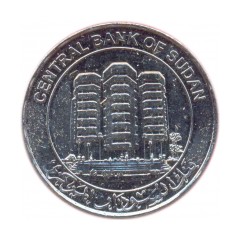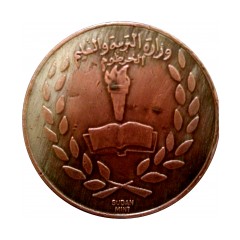officially the Republic of the Sudan (is a country in Northeast Africa. It is bordered by Egypt to the north, the Red Sea to the northeast, Eritrea to the east, Ethiopia to the southeast, South Sudan to the south, the Central African Republic to the southwest, Chad to the west, and Libya to the northwest. It has a population of 43 million people (2018 estimate) and occupies a total area of 1,886,068 square kilometres (728,215 square miles), making it the third-largest country in Africa. Sudan's predominant religion is Islam, and its official languages are Arabic and English. The capital is Khartoum, located at the confluence of the Blue and White Nile. Since 2011, Sudan is the scene of ongoing military conflict in its regions South Kordofan and the Blue Nile.
Sudan's history goes back to the Pharaonic period, witnessing the kingdom of Kerma (c. 2500 BC–1500 BC), the subsequent rule of the Egyptian New Kingdom (c. 1500 BC–1070 BC) and the rise of the kingdom of Kush (c. 785 BC–350 AD), which would in turn control Egypt itself for nearly a century. After the fall of Kush, the Nubians formed the three Christian kingdoms of Nobatia, Makuria and Alodia, with the latter two lasting until around 1500. Between the 14th and 15th centuries much of Sudan was settled by Arab nomads. From the 16th–19th centuries, central and eastern Sudan were dominated by the Funj sultanate, while Darfur ruled the west and the Ottomans the far north. This period saw extensive Islamisation and Arabisation.
From 1820 to 1874 the entirety of Sudan was conquered by the Muhammad Ali dynasty. Between 1881 and 1885, the harsh Egyptian reign was eventually met with a successful revolt led by the self-proclaimed Mahdi Muhammad Ahmad, resulting in the establishment of the Caliphate of Omdurman. This state was eventually destroyed in 1898 by the British, who would then govern Sudan together with Egypt.
The 20th century saw the growth of Sudanese nationalism and in 1953 Britain granted Sudan self-government. Independence was proclaimed on 1 January 1956. Since independence, Sudan has been ruled by a series of unstable parliamentary governments and military regimes. Under Gaafar Nimeiry, Sudan instituted Islamic law in 1983. This exacerbated the rift between the Islamic north, the seat of the government and the Animists and Christians in the south. Differences in language, religion, and political power erupted in a civil war between government forces, strongly influenced by the National Islamic Front (NIF), and the southern rebels, whose most influential faction was the Sudan People's Liberation Army (SPLA), eventually concluding in the independence of South Sudan in 2011.Between 1989 and 2019, Sudan experienced a 30-year-long military dictatorship led by Omar al-Bashir. Due to his actions, a War in Darfur Region broke out in 2003. Bashir was accused of ethnic genocide. Overall, the regime left 300,000-400,000 dead. Protests erupted in late 2018, demanding Bashir’s resignation. A Coup d’état was conducted on April 11, 2019, succeeding their efforts










